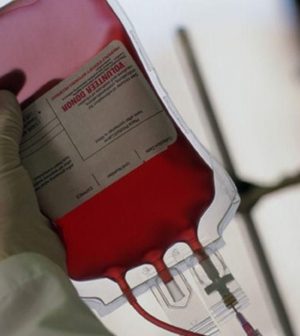- Recognizing the Signs of Hypothyroidism
- 10 Strategies to Overcome Insomnia
- Could Artificial Sweeteners Be Aging the Brain Faster?
- Techniques for Soothing Your Nervous System
- Does the Water in Your House Smell Funny? Here’s Why
- Can a Daily Dose of Apple Cider Vinegar Actually Aid Weight Loss?
- 6 Health Beverages That Can Actually Spike Your Blood Sugar
- Treatment Options for Social Anxiety Disorder
- Understanding the Connection Between Anxiety and Depression
- How Daily Prunes Can Influence Cholesterol and Inflammation
U.S. Blood Supply Is Safe From Coronavirus, Study Finds

COVID-19 does not pose a threat to the safety of the United States’ blood supply under existing donor screening guidelines, researchers report.
For the study, the investigators reviewed the results of tests for the presence of SARS-CoV-2 in nearly 18,000 pools of donated blood, representative of over 257,800 single blood donations that were collected between March and September 2020 from six U.S. metropolitan regions.
Only three of the samples tested positive, and all had very low concentrations of the virus.
The researchers concluded that the likelihood of a transfusion recipient receiving blood with trace amounts of SARS-CoV-2 was approximately 0.001% – a little over 1 in 100,000 – and that the likelihood of SARS-CoV-2 transmission by blood transfusion was insignificant compared to airborne transmission.
“This finding is good news for thousands of patients who may need a blood transfusion because of surgery or a disease that causes anemia, such as a rare blood-related condition or leukemia,” said study author Dr. Simone Glynn, chief of the Blood Epidemiology and Clinical Therapeutics Branch at the National Heart, Lung, and Blood Institute, which conducted the study along with the National Institute of Allergy and Infectious Diseases.
The results show there is no reason to change the current blood donor screening practices implemented in response to the COVID-19 pandemic, according to the study published May 27 in the journal Transfusion.
U.S. Food and Drug Administration screening guidelines do not require blood samples to be tested for SARS-CoV-2, but do require donors to be screened for physical symptoms of COVID-19 and for infections that occurred within 14 days of the blood donation. The blood of donors who’ve had recent COVID-19 infections cannot be used.
Study co-author Sonia Bakkour is a scientist at the Vitalant Research Institute in San Francisco. “Other studies have shown that, in rare cases where a blood sample tested positive, transmission by blood transfusion has not occurred,” Bakkour said in a U.S. National Institutes of Health news release.
“Therefore, it appears safe to receive blood as a transfusion recipient and to keep donating blood, without fear of transmitting COVID-19, as long as current screenings are used,” added Bakkour, who is also a scientist at the University of California, San Francisco’s department of laboratory medicine.
The American findings are similar to studies in Korea, Pakistan, China and France. The researchers also found that among the rare cases where SARS-CoV-2 was detected in a blood donation, it contained a low viral load and did not result in transmission of the virus.
More information
The American Red Cross has more on donating blood during the COVID-19 pandemic.
SOURCE: U.S. National Institutes of Health, news release, May 27, 2021
Source: HealthDay
Copyright © 2026 HealthDay. All rights reserved.










